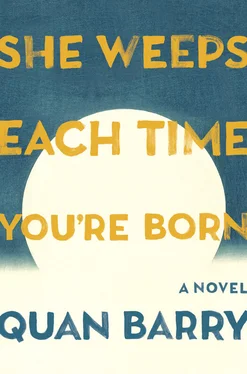If she had stayed, she would have seen the moment when the fire burned out. Sang didn’t take the hands reaching out from on deck to pull her up. Her head simply dropped. She stood a long moment in the new light of the world. Then without uttering a cry she reached over and put her hands on the splintery lip of the boat and pulled herself up.
It was a race and they were the prize. The crocodile was still somewhere under the water, its cold blood beating in the darkness. Son could feel his father growing heavier in his arms. He didn’t know how much longer he could hold on, though he was prepared to hold on forever. Across the water the sound of someone paddling toward them, each stroke like the ticking of a heart.
It was almost worse this way. When the yellow eyes had been on the surface, Son had felt a terror beyond compare. But now that the eyes had submerged it was incomprehensible. There was no word for it. The idea that one moment you could be floating in the water and the next all sentience could be ripped from your body. Then Son could see a makeshift raft coming toward them out of the darkness. Ba, Son whispered, shaking his father.
When the raft arrived, a hand swung An up out of the water first. Then Son felt himself being lifted. For a long time An lay heaving, water coming out of his mouth and nose. The man who had rescued them made a whistling sound through his teeth, and the white bird lifted off the river’s surface and floated up onto the raft. Lovingly the old man ran a finger down its neck, the tip of his long gray beard brushing the bird. The old man took off his non la . Son could see the moon reflected on his hairless head.
Twenty minutes later the raft rounded a bend. The boat was sitting in the middle of the river. It looked empty. Son wondered if the others had been caught. His father lay still. Son didn’t know what to say. Everything was out of his hands. Silently the old man rowed up to the boat. Son shook his father. Ba. His father began to stir, his blue eye almost invisible in the moonlight. We’re here, he said. Nobody came out to greet them. The man boosted Son up on deck. Before he even had a chance to look for his uncles, the man was already hoisting his father in the air. He turned and helped pull An on board.
Something stirred in the pilothouse. Cautiously Duc and Hai appeared like animals creeping out of the night. There were gasps of amazement. Son could hear his mother crying as one of his uncles carried him below. He could hardly breathe, it was so hot, the air like stagnant water, the whole space a crawlway, the hold no more than three feet at its highest and running the length of the boat. How did you get here, someone asked. A man picked us up in the river, Son said. What did he want, someone asked. Hai came bustling back down the steps. There’s no one out there, Hai hissed. Son raced back up the steps. He looked in all directions, but it was true.
When you are called to make the passage, just open your mouth and remember the sutra. It will feel like light flowing out of the body. Even if you are just a child, do not fight the temptation to remain. All forms are impermanent. What the world is trying to teach you: the only permanence is impermanence .
ONCE THEY’D RAISED ANCHOR, THEY MADE IT TO THE OCEAN in only a few hours. Duc left the motor off and let the currents carry them along. The Harvest Moon was still in the sky by the time they arrived at the sea. Dark cliffs ringed the bay like turrets. For the most part the boat stayed in the middle of the river as far from shore as possible. From time to time the river narrowed. When it did, they passed floating villages, villages much like the one they’d left behind, houses floating on matted river weeds and fifty-gallon drums, each house soundlessly bobbing in the water, the people off celebrating in the city. Only Duc and Hai in the pilothouse could see their good fortune firsthand.
Duc was surprised by how smoothly it had gone — no patrols, no stray fishermen following in their wake demanding to be taken along. In the pilothouse he watched the bay open before them. At the back of the boat Hai began prepping the motor. The tides were right. There was no reason to hesitate. They slipped into the dark waters of the bay as if it were a lake. The setting moon wavered on the waves. Then the engine turned over, the land steadily growing smaller and more distant. Within the hour it was gone.
Hai came down into the hold. He left the door open. Rabbit could feel the heat rushing out, fresh air pouring in. We’re at sea, Hai said in a quiet voice. They could come up out of the darkness. The sting of the salt felt welcoming those first few hours, their throats tingling with each breath.
For the first time since coming on board, Son could see how many people there were. Bodies on top of bodies. He didn’t know how they’d all fit. In addition to his own family, there were the Cambodians plus Rabbit and her family. As people began to pour out of the hold, he noticed the doctor gathering a woman and a young girl to his side. The girl was smaller than Rabbit. One of her feet was laced up tight in a thick black shoe. Together the three of them held hands and bowed their heads. When they were done, they touched their faces and chests in the same pattern. Son had never seen the woman or girl before, but he knew who they were by the way the doctor gripped their hands.
Son and Rabbit spent the rest of the first night on top of the pilothouse. In the sea air the deep scratch on his cheek was beginning to dry. Nobody cared that the two children had stationed themselves on the roof. It meant two fewer people on deck. The boat wasn’t built to carry them all. There were four other families related to the doctor. The men of the families were lawyers and engineers, men who had been to university and were forced to work as cyclo drivers and che sellers after reunification. Son knew that all over the river delta, professionals like these men were now doing the same backbreaking jobs as his uncles. Southern society had been turned upside down. People were dying in hospitals because the northern doctors shipped down to replace the “capitalist sympathizers” had received their medical certificates in less than six weeks.
Just before dawn there was a commotion in the hold, the sound of someone shouting. Together Rabbit and Son peered over the edge of the roof. One of the Cambodians came scrambling up on deck, Phuong trailing behind him beating his back with her fists. Sang appeared in the doorway. She was still wearing the red ao dai , the dress’s train flapping in the wind. Phuong was screaming about the man having his hand up Sang’s dress. Nobody paid much attention. Even An was more embarrassed than concerned. Everyone knew who had started it. Sang in the blood-red dress was still furious. The doctor’s wife shook her head.
The sun would be up within the hour. In the pilothouse Hai was still muttering about Hong Kong. If they were refugees in Hong Kong, it would be easier to find work while they stayed in a transit camp. Ever since the government had started harassing the three million ethnic Chinese who had lived in Saigon for generations, thousands of people had escaped the country by boat. There were refugee camps all over Southeast Asia. Hai had heard that in Hong Kong they let you out during the day. In Malaysia the people were Muslims. He had heard of the prohibitions there against pork and alcohol, even cards prohibited. Back in Ba Nuoc, Phuong had teased her younger brother. For you it will be worse than Vietnam, she said. No, Hai said, blowing a stream of cigarette smoke out through his nose. Nothing could be as bad as not having a future.
Rabbit was lying on her back and looking up at the stars. They were winking out, the sky lightening in the east. What’s wrong, said Son. Rabbit glared at him, her freckled face scowling. There was so much wrong. Forty people packed on a boat built to hold a handful, the engine already starting to stutter. Rabbit turned on her stomach and peered over the edge. She located Qui among the crowd squatting on a mat, Tu sitting next to her. They weren’t touching, but Rabbit could tell by the distance between them that they were aware of each other. In the wind Qui’s hair tickling Tu’s shoulder.
Читать дальше












